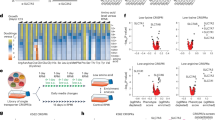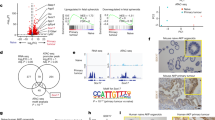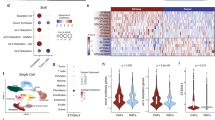Abstract
The tumor microenvironment (TME) exerts critical pro-tumorigenic effects through cytokines and growth factors that support cancer cell proliferation, survival, motility and invasion. Insulin-like growth factor-1 (IGF-1) and signal transducer and activator of transcription 3 (STAT3) stimulate colorectal cancer development and progression via cell autonomous and microenvironmental effects. Using a unique inhibitor, NT157, which targets both IGF-1 receptor (IGF-1R) and STAT3, we show that these pathways regulate many TME functions associated with sporadic colonic tumorigenesis in CPC-APC mice, in which cancer development is driven by loss of the Apc tumor suppressor gene. NT157 causes a substantial reduction in tumor burden by affecting cancer cells, cancer-associated fibroblasts (CAF) and myeloid cells. Decreased cancer cell proliferation and increased apoptosis were accompanied by inhibition of CAF activation and decreased inflammation. Furthermore, NT157 inhibited expression of pro-tumorigenic cytokines, chemokines and growth factors, including IL-6, IL-11 and IL-23 as well as CCL2, CCL5, CXCL7, CXCL5, ICAM1 and TGFβ; decreased cancer cell migratory activity and reduced their proliferation in the liver. NT157 represents a new class of anti-cancer drugs that affect both the malignant cell and its supportive microenvironment.
This is a preview of subscription content, access via your institution
Access options
Subscribe to this journal
Receive 50 print issues and online access
$259.00 per year
only $5.18 per issue
Buy this article
- Purchase on Springer Link
- Instant access to full article PDF
Prices may be subject to local taxes which are calculated during checkout





Similar content being viewed by others
References
Schlussel AT, Gagliano Jr RA, Seto-Donlon S, Eggerding F, Donlon T, Berenberg J et al. The evolution of colorectal cancer genetics-Part 1: from discovery to practice. J Gastrointest Oncol 2014; 5: 326–335.
Vogelstein B, Kinzler KW . Cancer genes and the pathways they control. Nat Med 2004; 10: 789–799.
Terzic J, Grivennikov S, Karin E, Karin M . Inflammation and colon cancer. Gastroenterology 2010; 138: 2101–2114 e2105.
Greten FR, Eckmann L, Greten TF, Park JM, Li ZW, Egan LJ et al. IKKbeta links inflammation and tumorigenesis in a mouse model of colitis-associated cancer. Cell 2004; 118: 285–296.
Grivennikov S, Karin E, Terzic J, Mucida D, Yu GY, Vallabhapurapu S et al. IL-6 and Stat3 are required for survival of intestinal epithelial cells and development of colitis-associated cancer. Cancer Cell 2009; 15: 103–113.
Grivennikov SI, Karin M . Inflammatory cytokines in cancer: tumour necrosis factor and interleukin 6 take the stage. Ann Rheum Dis 2011; 70: i104–i108.
Putoczki TL, Thiem S, Loving A, Busuttil RA, Wilson NJ, Ziegler PK et al. Interleukin-11 is the dominant IL-6 family cytokine during gastrointestinal tumorigenesis and can be targeted therapeutically. Cancer Cell 2013; 24: 257–271.
Calon A, Espinet E, Palomo-Ponce S, Tauriello DV, Iglesias M, Céspedes MV et al. Dependency of colorectal cancer on a TGF-beta-driven program in stromal cells for metastasis initiation. Cancer Cell 2012; 22: 571–584.
Lee KW, Yeo SY, Sung CO, Kim SH . Twist1 is a key regulator of cancer-associated fibroblasts. Cancer Res 2015; 75: 73–85.
Grivennikov SI, Greten FR, Karin M . Immunity, inflammation, and cancer. Cell 2010; 140: 883–899.
Mantovani A, Allavena P, Sica A, Balkwill F . Cancer-related inflammation. Nature 2008; 454: 436–444.
Grivennikov SI, Wang K, Mucida D, Stewart CA, Schnabl B, Jauch D et al. Adenoma-linked barrier defects and microbial products drive IL-23/IL-17-mediated tumour growth. Nature 2012; 491: 254–258.
Wang K, Kim MK, Di Caro G, Wong J, Shalapour S, Wan J et al. Interleukin-17 receptor a signaling in transformed enterocytes promotes early colorectal tumorigenesis. Immunity 2014; 41: 1052–1063.
Joyce JA, Pollard JW . Microenvironmental regulation of metastasis. Nat Rev Cancer 2009; 9: 239–252.
Kalluri R, Zeisberg M . Fibroblasts in cancer. Nat Rev Cancer 2006; 6: 392–401.
Straussman R, Morikawa T, Shee K, Barzily-Rokni M, Qian ZR, Du J, Davis A et al. Tumour micro-environment elicits innate resistance to RAF inhibitors through HGF secretion. Nature 2012; 487: 500–504.
Feng QY, Wei Y, Chen JW, Chang WJ, Ye LC, Zhu DX et al. Anti-EGFR and anti-VEGF agents: important targeted therapies of colorectal liver metastases. World J Gastroenterol 2014; 20: 4263–4275.
Pollak M . The insulin and insulin-like growth factor receptor family in neoplasia: an update. Nat Rev Cancer 2012; 12: 159–169.
Ryan PD, Goss PE . The emerging role of the insulin-like growth factor pathway as a therapeutic target in cancer. Oncologist 2008; 13: 16–24.
Surmacz E . Growth factor receptors as therapeutic targets: strategies to inhibit the insulin-like growth factor I receptor. Oncogene 2003; 22: 6589–6597.
Giovannucci E . Insulin, insulin-like growth factors and colon cancer: a review of the evidence. J Nutr 2001; 131: 3109S–3120S.
Woodson K, Flood A, Green L, Tangrea JA, Hanson J, Cash B et al. Loss of insulin-like growth factor-II imprinting and the presence of screen-detected colorectal adenomas in women. J Natl Cancer Inst 2004; 96: 407–410.
Shiratsuchi I, Akagi Y, Kawahara A, Kinugasa T, Romeo K, Yoshida T et al. Expression of IGF-1 and IGF-1R and their relation to clinicopathological factors in colorectal cancer. Anticancer Res 2011; 31: 2541–2545.
Ollberding NJ, Cheng I, Wilkens LR, Henderson BE, Pollak MN, Kolonel LN et al. Genetic variants, prediagnostic circulating levels of insulin-like growth factors, insulin, and glucose and the risk of colorectal cancer: the Multiethnic Cohort study. Cancer Epidemiol Biomarkers Prev 2012; 21: 810–820.
Lee J, Jain A, Kim P, Lee T, Kuller A, Princen F et al. Activated cMET and IGF1R-driven PI3K signaling predicts poor survival in colorectal cancers independent of KRAS mutational status. PLoS One 2014; 9: e103551.
Heron-Milhavet L, LeRoith D . Insulin-like growth factor I induces MDM2-dependent degradation of p53 via the p38 MAPK pathway in response to DNA damage. J Biol Chem 2012; 277: 15600–15606.
Peretz S, Jensen R, Baserga R, Glazer PM . ATM-dependent expression of the insulin-like growth factor-I receptor in a pathway regulating radiation response. Proc Natl Acad Sci USA 2001; 98: 1676–1681.
Albanell J, Baselga J . Unraveling resistance to trastuzumab (Herceptin): insulin-like growth factor-I receptor, a new suspect. J Natl Cancer Inst 2001; 93: 1830–1832.
Jones HE, Goddard L, Gee JM, Hiscox S, Rubini M, Barrow D et al. Insulin-like growth factor-I receptor signalling and acquired resistance to gefitinib (ZD1839; Iressa) in human breast and prostate cancer cells. Endocr Relat Cancer 2004; 11: 793–814.
Huang F, Xu LA, Khambata-Ford S . Correlation between gene expression of IGF-1R pathway markers and cetuximab benefit in metastatic colorectal cancer. Clin Cancer Res 2012; 18: 1156–1166.
Chan BT, Lee AV . Insulin receptor substrates (IRSs) and breast tumorigenesis. J Mammary Gland Biol Neoplasia 2008; 13: 415–422.
Ramocki NM, Wilkins HR, Magness ST, Simmons JG, Scull BP, Lee GH et al. Insulin receptor substrate-1 deficiency promotes apoptosis in the putative intestinal crypt stem cell region, limits Apcmin/+ tumors, and regulates Sox9. Endocrinology 2008; 149: 261–267.
Esposito DL, Aru F, Lattanzio R, Morgano A, Abbondanza M, Malekzadeh R et al. The insulin receptor substrate 1 (IRS1) in intestinal epithelial differentiation and in colorectal cancer. PLoS One 2012; 7: e36190.
Chang Q, Li Y, White MF, Fletcher JA, Xiao S . Constitutive activation of insulin receptor substrate 1 is a frequent event in human tumors: therapeutic implications. Cancer Res 2002; 62: 6035–6038.
Reuveni H, Flashner-Abramson E, Steiner L, Makedonski K, Song R, Shir A et al. Therapeutic destruction of insulin receptor substrates for cancer treatment. Cancer Res 2013; 73: 4383–4394.
Hinoi T, Akyol A, Theisen BK, Ferguson DO, Greenson JK, Williams BO et al. Mouse model of colonic adenoma-carcinoma progression based on somatic Apc inactivation. Cancer Res 2007; 67: 9721–9730.
Rojas A, Liu G, Coleman I, Nelson PS, Zhang M, Dash R et al. IL-6 promotes prostate tumorigenesis and progression through autocrine cross-activation of IGF-IR. Oncogene 2011; 30: 2345–2355.
Zhang W, Zong CS, Hermanto U, Lopez-Bergami P, Ronai Z, Wang LH . RACK1 recruits STAT3 specifically to insulin and insulin-like growth factor 1 receptors for activation, which is important for regulating anchorage-independent growth. Mol Cell Biol 2006; 26: 413–424.
Zong CS, Chan J, Levy DE, Horvath C, Sadowski HB, Wang LH . Mechanism of STAT3 activation by insulin-like growth factor I receptor. J Biol Chem 2000; 275: 15099–15105.
Xiong H, Du W, Sun TT, Lin YW, Wang JL, Hong J et al. A positive feedback loop between STAT3 and cyclooxygenase-2 gene may contribute to Helicobacter pylori-associated human gastric tumorigenesis. Int J Cancer 2014; 134: 2030–2040.
Tang Z, Yu M, Miller F, Berk RS, Tromp G, Kosir MA et al. Increased invasion through basement membrane by CXCL7-transfected breast cells. Am J Surg 2008; 196: 690–696.
Zhou SL, Dai Z, Zhou ZJ, Chen Q, Wang Z, Xiao YS et al. CXCL5 contributes to tumor metastasis and recurrence of intrahepatic cholangiocarcinoma by recruiting infiltrative intratumoral neutrophils. Carcinogenesis 2014; 35: 597–605.
Prager GW, Poettler M . Angiogenesis in cancer. Basic mechanisms and therapeutic advances. Hamostaseologie 2012; 32: 105–114.
Bonapace L, Coissieux MM, Wyckoff J, Mertz KD, Varga Z, Junt T et al. Cessation of CCL2 inhibition accelerates breast cancer metastasis by promoting angiogenesis. Nature 2014; 515: 130–133.
Soubry A, Il'yasova D, Sedjo R, Wang F, Byers T, Rosen C et al. Increase in circulating levels of IGF-1 and IGF-1/IGFBP-3 molar ratio over a decade is associated with colorectal adenomatous polyps. Int J Cancer 2012; 131: 512–517.
Tosolini M, Kirilovsky A, Mlecnik B, Fredriksen T, Mauger S, Bindea G et al. Clinical impact of different classes of infiltrating T cytotoxic and helper cells (Th1, th2, treg, th17) in patients with colorectal cancer. Cancer Res 2011; 71: 1263–1271.
Sonoshita M, Takaku K, Sasaki N, Sugimoto Y, Ushikubi F, Narumiya S et al. Acceleration of intestinal polyposis through prostaglandin receptor EP2 in Apc(Delta 716) knockout mice. Nat Med 2001; 7: 1048–1051.
Arber N, Eagle CJ, Spicak J, Rácz I, Dite P, Hajer J et al. Celecoxib for the prevention of colorectal adenomatous polyps. N Engl J Med 2006; 355: 885–895.
Qian BZ, Pollard JW . Macrophage diversity enhances tumor progression and metastasis. Cell 2010; 141: 39–51.
Maeda S, Hikiba Y, Sakamoto K, Nakagawa H, Hirata Y, Hayakawa Y et al. Ikappa B kinasebeta/nuclear factor-kappaB activation controls the development of liver metastasis by way of interleukin-6 expression. Hepatology 2009; 50: 1851–1860.
Acknowledgements
ESL was supported by Sara Borrell fellowship ISCIII/MICINN program. SS and ZZ are CRI Irvington postdoctoral fellows. KT is Uehara Memorial Foundation Fellow. AL and EFA were supported by ERC Advanced Grant (249898) to AL. Research was supported by NIH grants (AI043477 and CA118165) to MK, who is an American Cancer Society Research Professor and holds the Ben and Wanda Hildyard Chair for Mitochondrial and Metabolic Diseases.
Author information
Authors and Affiliations
Corresponding author
Ethics declarations
Competing interests
The authors declare no conflict of interest.
Additional information
Supplementary Information accompanies this paper on the Oncogene website
Supplementary information
Rights and permissions
About this article
Cite this article
Sanchez-Lopez, E., Flashner-Abramson, E., Shalapour, S. et al. Targeting colorectal cancer via its microenvironment by inhibiting IGF-1 receptor-insulin receptor substrate and STAT3 signaling. Oncogene 35, 2634–2644 (2016). https://doi.org/10.1038/onc.2015.326
Received:
Revised:
Accepted:
Published:
Issue Date:
DOI: https://doi.org/10.1038/onc.2015.326
This article is cited by
-
Tumor-associated macrophages in colorectal cancer metastasis: molecular insights and translational perspectives
Journal of Translational Medicine (2024)
-
Intimate communications within the tumor microenvironment: stromal factors function as an orchestra
Journal of Biomedical Science (2023)
-
Define cancer-associated fibroblasts (CAFs) in the tumor microenvironment: new opportunities in cancer immunotherapy and advances in clinical trials
Molecular Cancer (2023)
-
IL1R1+ cancer-associated fibroblasts drive tumor development and immunosuppression in colorectal cancer
Nature Communications (2023)
-
Targeting the E3 ligase NEDD4 as a novel therapeutic strategy for IGF1 signal pathway-driven gastric cancer
Oncogene (2023)



